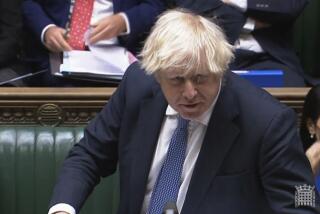Britain and Commonwealth Split on Sanctions
- Share via
VANCOUVER, Canada — Britain on Friday refused demands by other Commonwealth governments to strengthen or extend economic sanctions against South Africa and declined to even take part in monitoring the effectiveness of existing programs to punish the Pretoria regime for its racial segregation policies.
In a communique issued by the heads of governments attending the biennial conference of the 57-nation Commonwealth, British Prime Minister Margaret Thatcher was noted as taking exception to five proposals, approved by every other participant, aimed at forcing an end to apartheid, South Africa’s system of racial segregation, by enforcing sanctions.
Since Britain’s investments of nearly $15 billion in South Africa and its two-way trade of another $1 billion is more than all other Commonwealth nations combined, a refusal by Thatcher to participate in sanctions essentially reduces Friday’s demands to ineffective rhetoric.
The British stance was similar to that taken at the last Commonwealth conference two years ago in the Bahamas, where Thatcher thwarted an effort for mandatory sanctions against South Africa, agreeing only to a very limited and voluntary program of reducing investment and trade with Pretoria.
‘Sanctions Don’t Work’
“The British position is that sanctions don’t work and are counterproductive,” explained a British official, adding that “violence and sanctions are likely to harden attitudes” by South African leaders.
Still, the official said, Britain will abide by its previous, albeit weak commitments to act against Pretoria. However, he said his government could not go along with the other leaders’ plans to create new procedures to monitor the effectiveness and adherence to the previous sanction programs.
In spite of the refusal to go along with punitive economic actions and the new monitoring program, Thatcher joined in a strongly-worded condemnation of apartheid and accepted communique language that “as Commonwealth members we have the continuing obligation to make effective contribution towards the ending of apartheid.”
British spokesmen also pointed out that Thatcher was a leader during the session in seeking increased and wider economic and military aid to black African states neighboring South Africa and economically dependent on that nation.
Aid to Front-Line States
Britain already spends tens of millions of dollars in aid to these so-called Front Line states, including military aid and training, and is the major financial support for construction of a rail line through Mozambique to lessen black African dependence on South Africa for access to ocean ports.
The communique issued after the heads of government had met privately at a mountain lake retreat, 250 miles north of Vancouver, said that “we have decided to initiate an enhanced program of coordinated Commonwealth assistance.”
More to Read
Sign up for Essential California
The most important California stories and recommendations in your inbox every morning.
You may occasionally receive promotional content from the Los Angeles Times.













